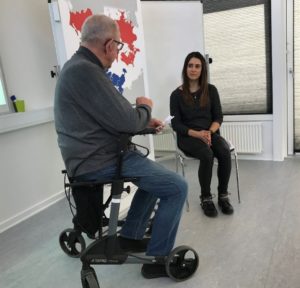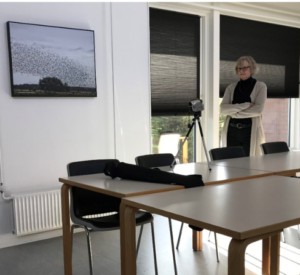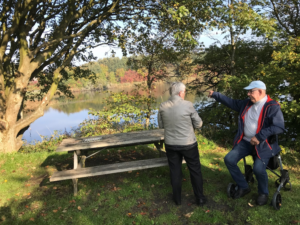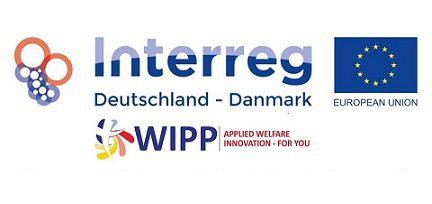 In October 2018, many WIPP activities took place, including the WIPP partner- and networkpartner- meeting in Esbjerg. In this context, 4 participants of the 2 different WIPP interventions by Carina Wilkens and Petra Hampel were interviewed in the framework of the WIPP Work Package 2 (WP2) of the European University of Flensburg in the Østerby Health Center in Esbjerg. It was about the experiences of senior citizens participating in WIPP.
In October 2018, many WIPP activities took place, including the WIPP partner- and networkpartner- meeting in Esbjerg. In this context, 4 participants of the 2 different WIPP interventions by Carina Wilkens and Petra Hampel were interviewed in the framework of the WIPP Work Package 2 (WP2) of the European University of Flensburg in the Østerby Health Center in Esbjerg. It was about the experiences of senior citizens participating in WIPP.
Peer Christensen thanked as one of the participants of the intervention “Form Your Life” (Red.: called in WIPP “CALSTI”) to increase the physical activity for the interview and wrote about today’s meeting and the interview:
“During the meeting we had a visit from two ladies from Germany, who had to evaluate what we did at our meetings, one spoke only German, the other spoke and understood excellent Danish …”

Peer further reports that WIPP has been a very good start for him and that the course was well received. What the course brings in the long term, he can hardly say. Against this background, Peer has already reached the first interim target. The week before, the group had discussed the “small changes” of each participant. The “small changes” are the focus of the intervention. It enables citizens to improve their well-being and health with their own goals as a guiding principle, especially with the aim of bringing more exercise into everyday life. Small goals that can lead to significant health benefits in the long term. For Peer this was to change his routine in everyday life. There was a talk about an activity he had given up; to use the rowing machine every day at home. This goal has been achieved today:
“The two sworn Pernille and Anne Marie (Red.: trainer and other participant) have supported me and I’m glad, so I thank you for it.”
WIPP puts the focus on early detection and prevention of loss of functionality. The interventions help older citizens to find activities that can be carried out as independently as possible and that prevent inappropriate behavior. Peer relies on his walker, but he knows that the muscles need to be preserved so the walker can continue to support him. He knows that physical activity is very important to him. Peer therefore believes that the WIPP intervention “Forms Your Life” can make a difference for this particular aspect and writes about it:
“Physical activity and training for + 65-year-olds, I do not think we do much in our daily lives, if we do not get a kick or understand how much it means for health, I think we just sit back and say that we have lived a life, we want to relax now, we know that it is not so difficult, but we need the helping hand to get started.”
Peer is glad that the intervention has taken him out of the routines and out the door. He will undoubtedly continue until the end of the intervention and discover ways to find new social communities. The meeting with Petra and Carina has highlighted the sincerity of the project for Peer and the other participants, and Peer is motivated to achieve more “small changes”:

“Likewise, I think that WIPP allows me to achieve a few more good years of life with this effort.”
Picture: Activity in “Form your life” – walk in the area. Peer tells and shows the coaches and participants the way into the beautiful nature.
